-
ORIGINAL ARTICLE02-03-2023
Quality of life and satisfaction of students with auriculotherapy in the covid-19 pandemic: a quasi-experimental study
Revista Brasileira de Enfermagem. 2023;76:e20220522
Abstract
ORIGINAL ARTICLEQuality of life and satisfaction of students with auriculotherapy in the covid-19 pandemic: a quasi-experimental study
Revista Brasileira de Enfermagem. 2023;76:e20220522
DOI 10.1590/0034-7167-2022-0522
Views0See moreABSTRACT
Objectives:
to evaluate the quality of life before and after the application of auriculotherapy and the satisfaction of university students with the treatment during the covid-19 pandemic.
Methods:
quasi-experimental study conducted with 44 students in a University Health Center. The intervention consisted of ten sessions of auriculotherapy focusing on emotional changes with quality of life assessment before and after treatment. The study also investigated the satisfaction concerning the intervention.
Results:
predominated among the students: women, from health courses, in use of psychotropic drugs and complaining of emotional changes. There was a statistically significant increase in all domains of quality of life, and students were satisfied with the treatment.
Conclusions:
auriculotherapy improved the quality of life of university students during the covid-19 pandemic, and the level of satisfaction with the treatment was high.
-
ORIGINAL ARTICLE02-03-2023
Factors associated with the safety culture of patients under dialysis in the context of the COVID-19 pandemic
Revista Brasileira de Enfermagem. 2023;76:e20220280
Abstract
ORIGINAL ARTICLEFactors associated with the safety culture of patients under dialysis in the context of the COVID-19 pandemic
Revista Brasileira de Enfermagem. 2023;76:e20220280
DOI 10.1590/0034-7167-2022-0280
Views0See moreABSTRACT
Objectives:
to assess the factors associated with the safety culture of patients under dialysis in the context of the COVID-19 pandemic.
Methods:
a cross-sectional and analytical study, carried out in Minas Gerais, with 134 professionals from three dialysis services. The Hospital Survey on Patient Safety Culture, adapted for Brazil, was used.
Results:
only variable type of management was associated with the highest percentage of positive response in public and private services. Patient safety was rated as good by 55.7% of respondents. In dimension assessment, the public service presented one strength and five weaknesses, the private service did not present weak areas, and the philanthropic service presented a weakness. The priority areas for improvement actions are represented by dimensions “Nonpunitive response to error” and “Staffing”.
Conclusions:
interventions should consider the type of service management, as it is a factor associated with safety culture.
-
ORIGINAL ARTICLE02-03-2023
Remote teaching during the COVID-19 pandemic: repercussions from professors’ perspective
Revista Brasileira de Enfermagem. 2023;76:e20220172
Abstract
ORIGINAL ARTICLERemote teaching during the COVID-19 pandemic: repercussions from professors’ perspective
Revista Brasileira de Enfermagem. 2023;76:e20220172
DOI 10.1590/0034-7167-2022-0172
Views0See moreABSTRACT
Objectives:
to understand the repercussions of teaching work in remote teaching during the COVID-19 pandemic in Higher Education Institutions in northern Santa Catarina.
Methods:
a qualitative participatory action research, based on Paulo Freire’s theoretical-methodological precepts. Seventeen health professors participated in two Virtual Culture Circles held in the first half of 2021.
Results:
six generating themes emerged for discussion, which aroused in participants’ feelings and perspectives regarding the remote teaching process in the pandemic context, with an emphasis on the connectivity theme, which generated dialogue through reports of personal experiences.
Final Considerations:
the pandemic has had repercussions in sectors such as health and education. Professors talked about their experience in creating, recreating and adapting to remote teaching and the challenges facing the teaching-learning process, listing the worsening of mental health and the need to learn new digital technologies.

-
ORIGINAL ARTICLE01-30-2023
Pressure injury prevention in older people: construction and validation of an instrument for caregivers
Revista Brasileira de Enfermagem. 2023;76(1):e20210930
Abstract
ORIGINAL ARTICLEPressure injury prevention in older people: construction and validation of an instrument for caregivers
Revista Brasileira de Enfermagem. 2023;76(1):e20210930
DOI 10.1590/0034-7167-2021-0930
Views0See moreABSTRACT
Objectives:
to construct and validate an instrument to assess the knowledge, attitudes, and practices related to pressure injury prevention among caregivers of institutionalized older people.
Methods:
this is a three-stage methodological study that consisted of instrument construction, analysis by experts, and semantic and appearance analysis, with 78 participants, observing the validation process steps for psychometric instruments in the criteria of clarity and relevance.
Results:
in the Delphi I round, the validity index of the general content in the clarity criterion was 0.66, in relevance 0.85, and the Kappa value was >0.76. In Delphi II, clarity was 0.95, relevance 1.00, and the Kappa value was >0.97.
Conclusions:
this is a valid instrument in terms of content and appearance, which allows further analysis of its reliability for the measurement of the constructs for which it is intended. Therefore, it can be considered a tool for care management in pressure injury prevention.
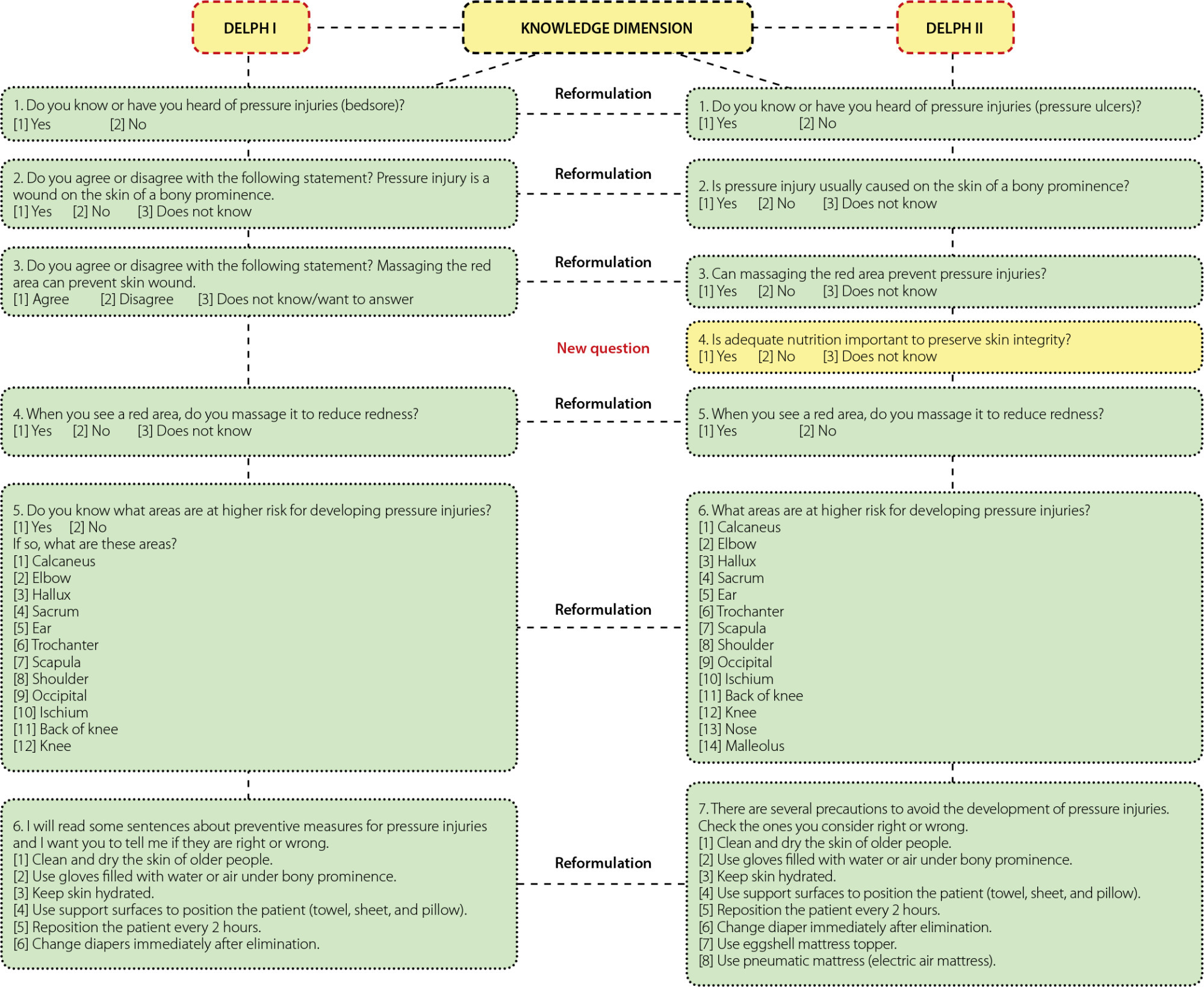
-
ORIGINAL ARTICLE01-30-2023
Accuracy of the nursing diagnosis of ineffective airway clearance in intensive care unit patients
Revista Brasileira de Enfermagem. 2023;76(1):e20220174
Abstract
ORIGINAL ARTICLEAccuracy of the nursing diagnosis of ineffective airway clearance in intensive care unit patients
Revista Brasileira de Enfermagem. 2023;76(1):e20220174
DOI 10.1590/0034-7167-2022-0174
Views0See moreABSTRACT
Objectives:
to analyze the accuracy of the clinical indicators of ineffective airway clearance in adult intensive care unit patients.
Methods:
diagnostic accuracy study, performed in the intensive care unit of a university hospital in northeastern Brazil. The sample consisted of 104 patients hospitalized between June and October 2019.
Results:
the prevalence of ineffective airway clearance was 36.54%. The indicators with high specificity included absence of cough (0.8326), orthopnea (0.6817), adventitious breath sounds (0.8175), and diminished breath sounds (0.8326). The clinical indicators with high sensitivity and specificity were alteration in respiratory rate (0.9999) and alteration in respiratory pattern (0.9999).
Conclusions:
six clinical indicators provided an accurate identification of ineffective airway clearance. The clinical indicators alteration in respiratory rate and alteration in respiratory pattern were the most accurate for critical adult patients. The findings of this study contribute to accurate diagnostic inferences and to prevention of respiratory complications in these patients.
-
ORIGINAL ARTICLE01-30-2023
Adverse dermatoneurological events and impacts on daily activities of patients with gastrointestinal neoplasms undergoing chemotherapy
Revista Brasileira de Enfermagem. 2023;76(1):e20220161
Abstract
ORIGINAL ARTICLEAdverse dermatoneurological events and impacts on daily activities of patients with gastrointestinal neoplasms undergoing chemotherapy
Revista Brasileira de Enfermagem. 2023;76(1):e20220161
DOI 10.1590/0034-7167-2022-0161
Views0See moreABSTRACT
Objective:
to associate the presence and grading of adverse dermatoneurological events (peripheral neuropathy and hand-foot syndrome) and the interference in the activities of daily living of patients with gastrointestinal neoplasms undergoing systemic antineoplastic treatment.
Method:
this is a longitudinal, prospective study, using instruments to assess hand-foot syndrome and peripheral neuropathy.
Results:
there were 36 patients: 66.7% diagnosed with colon cancer and 83.2% on combination therapy. From cycle 5 onwards, all of them had hand-foot syndrome, with a majority of grade 1, unrelated to interference in activities of daily living. Regarding peripheral neuropathy, there was a moderate to strong correlation from cycle 1 of treatment.
Conclusion:
peripheral neuropathy negatively affects activities of daily living. The monitoring of dermatoneurological events by oncology nurses contributes to the clinical practice of nursing and subsidizes the development of advanced practice in the country.
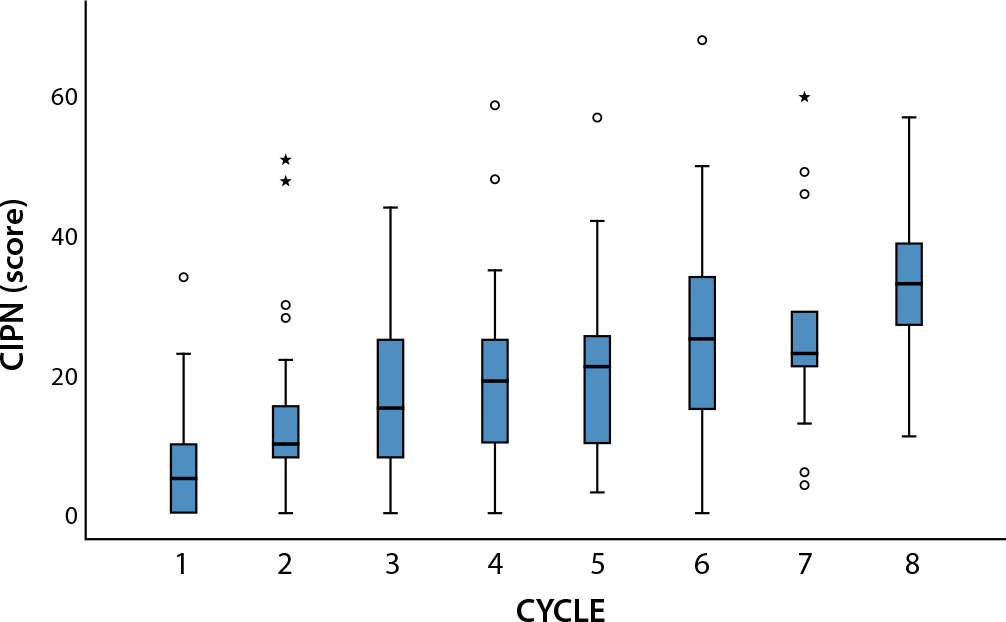
-
ORIGINAL ARTICLE01-30-2023
Educational material production and validity: educational instrument for home care for premature newborns
Revista Brasileira de Enfermagem. 2023;76(1):e20210648
Abstract
ORIGINAL ARTICLEEducational material production and validity: educational instrument for home care for premature newborns
Revista Brasileira de Enfermagem. 2023;76(1):e20210648
DOI 10.1590/0034-7167-2021-0648
Views0See moreABSTRACT
Objective:
to produce and validate a booklet, based on Jean Watson’s Theory, on home care for premature newborns, based on caregivers’ experiences.
Method:
a methodological study, developed in the following stages: diagnosis of knowledge needs about home care; survey of scientific content; educational material production; and validity by judges/experts.
Results:
the literature review resulted in 19 articles. The main themes (breastfeeding, bath care, bond building, infection prevention and support network) were listed for producing the booklet “Booklet for Premature Newborns: Demystifying Home Care”. The booklet content and appearance received the overall Content Validity Index of 0.85, considered suitable within the scientific rigor of validity.
Final considerations:
the booklet produced and validated is an educational material whose main role is to provide knowledge and awaken caregivers’ autonomy in providing home care to newborns.
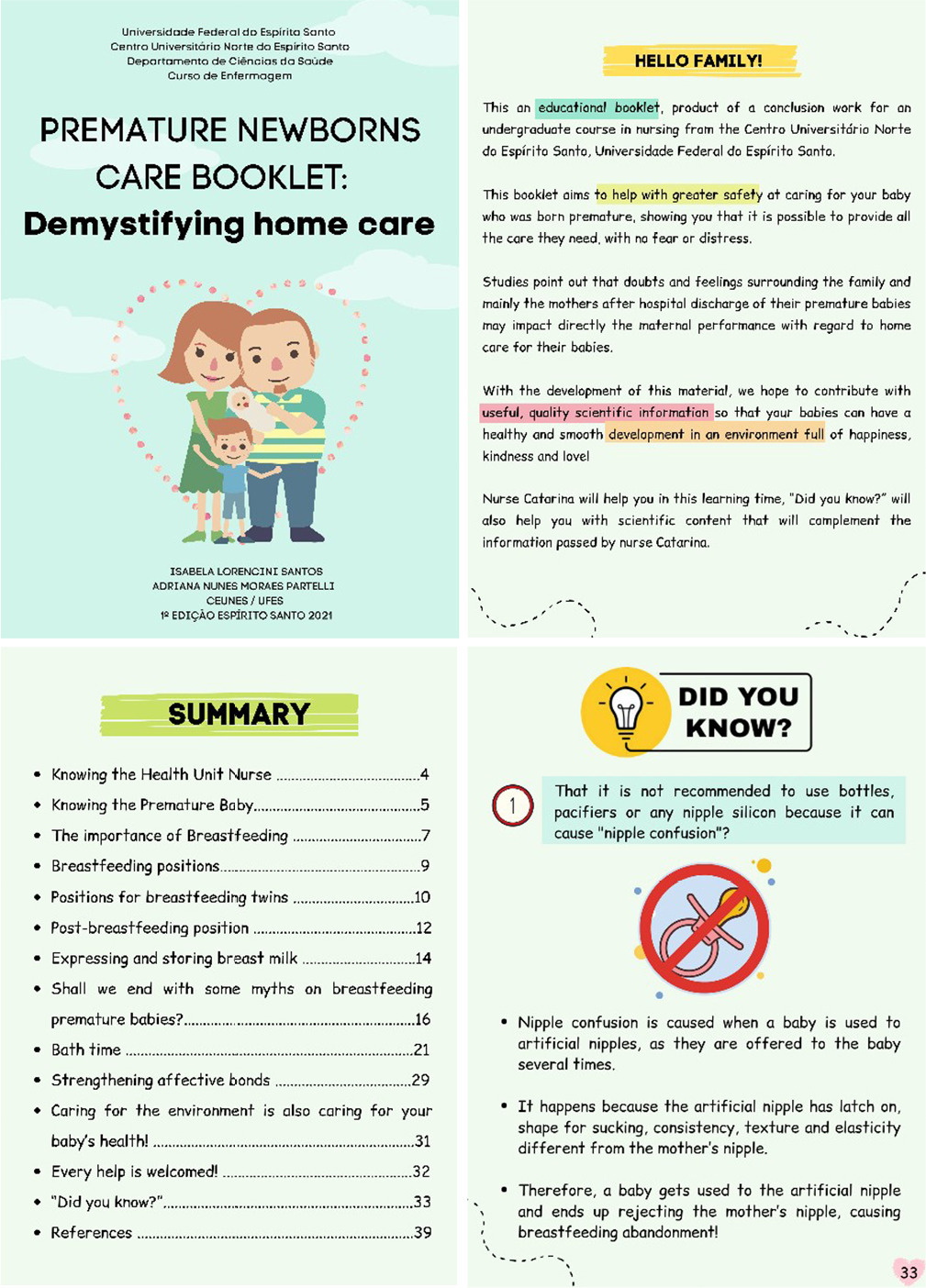
-
ORIGINAL ARTICLE01-30-2023
Development and validation of an instrument for the evaluation of HIV care in Primary Health Care
Revista Brasileira de Enfermagem. 2023;76(1):e20220247
Abstract
ORIGINAL ARTICLEDevelopment and validation of an instrument for the evaluation of HIV care in Primary Health Care
Revista Brasileira de Enfermagem. 2023;76(1):e20220247
DOI 10.1590/0034-7167-2022-0247
Views0See moreABSTRACT
Objective:
To develop and validate an instrument to evaluate the decentralization process of care for People Living with HIV in Primary Health Care.
Method:
Methodological study, developed in four stages: elaboration of the logical model based on the triad Structure-Process-Outcomes; development of the instrument; content validation by expert judges and technical reviewers; and semantic validation. Online questionnaires were used, and the Kappa index was used for analysis.
Results:
The instrument with 68 items and 8 factors was submitted to validation by expert judges who recommended the exclusion of 3 items and the alteration of 2 factors. In the validation by technical reviewers, 2 items were excluded and 6 factors were highlighted; the agreement index was ≥0.75. In the semantic validation, 87.3% of the judges answered “totally agree” for the items presented.
Conclusion:
The instrument is validated for its content, has 63 items and has the potential to assess the care provided for people living with HIV in Primary Health Care.

-
ORIGINAL ARTICLE02-03-2023
Quality of life and satisfaction of students with auriculotherapy in the covid-19 pandemic: a quasi-experimental study
Revista Brasileira de Enfermagem. 2023;76:e20220522
Abstract
ORIGINAL ARTICLEQuality of life and satisfaction of students with auriculotherapy in the covid-19 pandemic: a quasi-experimental study
Revista Brasileira de Enfermagem. 2023;76:e20220522
DOI 10.1590/0034-7167-2022-0522
Views0See moreABSTRACT
Objectives:
to evaluate the quality of life before and after the application of auriculotherapy and the satisfaction of university students with the treatment during the covid-19 pandemic.
Methods:
quasi-experimental study conducted with 44 students in a University Health Center. The intervention consisted of ten sessions of auriculotherapy focusing on emotional changes with quality of life assessment before and after treatment. The study also investigated the satisfaction concerning the intervention.
Results:
predominated among the students: women, from health courses, in use of psychotropic drugs and complaining of emotional changes. There was a statistically significant increase in all domains of quality of life, and students were satisfied with the treatment.
Conclusions:
auriculotherapy improved the quality of life of university students during the covid-19 pandemic, and the level of satisfaction with the treatment was high.
-
ORIGINAL ARTICLE08-16-2021
Management in clinical simulation: a proposal for best practices and process optimization
Revista Brasileira de Enfermagem. 2021;74:e20200515
Abstract
ORIGINAL ARTICLEManagement in clinical simulation: a proposal for best practices and process optimization
Revista Brasileira de Enfermagem. 2021;74:e20200515
DOI 10.1590/0034-7167-2020-0515
Views0See moreABSTRACT
Objectives:
to develop a best practices document with facilitating components and processes for simulation management.
Methods:
the methodological research was conducted between April and October 2017, using four approaches: observational research, conducted in an international simulation institution; Definition of theoretical framework, from the International Nursing Association for Clinical Simulation and Learning; integrative literature review, in international databases; and comparative analysis. It used Bardin’s analysis for the categorization of the information.
Results:
creation of a document with good practices in simulation regarding management and practice in simulation and management of resources and data, highlighting the use of technology and the training of professionals as the most important allies for overcoming the main limitations found.
Final Considerations:
the product of this study is a compilation of strategies for simulation management as a tool to enhance the application of the method with greater effectiveness.
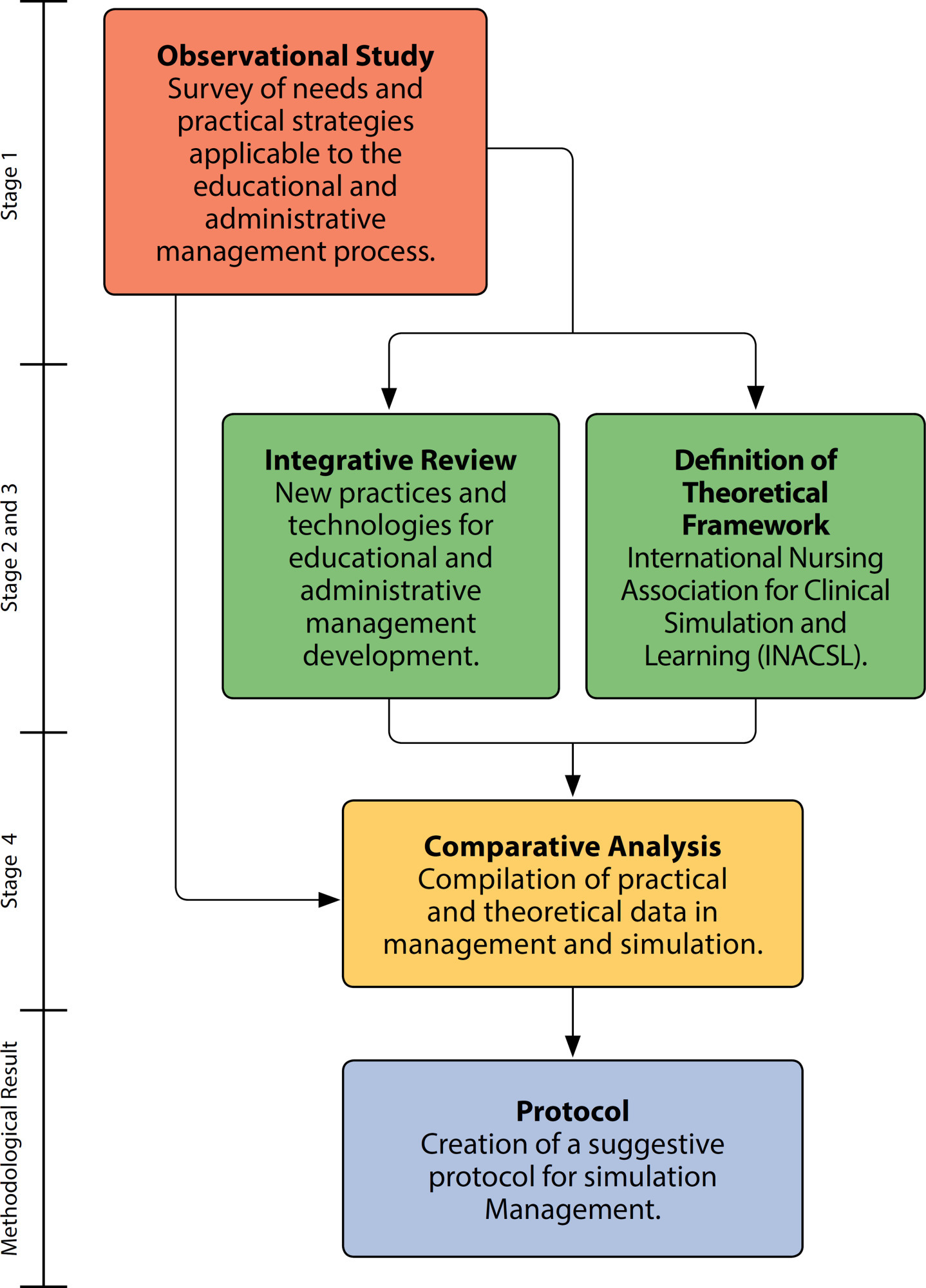
-
ORIGINAL ARTICLE08-19-2019
Health promotion by nursing technicians from the nurses’ perspective
Revista Brasileira de Enfermagem. 2019;72(4):979-987
Abstract
ORIGINAL ARTICLEHealth promotion by nursing technicians from the nurses’ perspective
Revista Brasileira de Enfermagem. 2019;72(4):979-987
DOI 10.1590/0034-7167-2018-0552
Views0See moreABSTRACT
Objective:
to analyze education and practice of nursing technicians in health promotion, from the perspective of teaching nurses of technical course and Primary Health Care nurses.
Method:
an exploratory study with qualitative data analysis, carried out in the city of São Paulo, through semi-structured interviews with nine public technical professors and 16 nurses from the basic health network. Data thematic analysis was carried out.
Results:
three thematic categories have emerged: Conceptions and experiences on health promotion; Nursing technician’s practice in health promotion; and Nursing technician education on health promotion.
Final considerations:
it is necessary to review the centrality given to technicalism in the education and practice of nursing technicians, contemplating the health promotion and seeking the development of professional competence for the construction of transformative practices aimed at valuing the autonomy and proactivity of the people in health and quality of life production.
-
REFLECTION02-15-2021
The belief in health in the adoption of COVID-19 prevention and control measures
Revista Brasileira de Enfermagem. 2021;74:e20200576
Abstract
REFLECTIONThe belief in health in the adoption of COVID-19 prevention and control measures
Revista Brasileira de Enfermagem. 2021;74:e20200576
DOI 10.1590/0034-7167-2020-0576
Views0See moreABSTRACT
Objective:
Reflect, in the light of the Health Belief Model, on the adoption of behavioral measures in the context of COVID-19.
Methods:
Theoretical-reflective essay, based on the Health Belief Model, to reflect on adherence to preventive behaviors in the pandemic of COVID-19.
Results:
Adherence to preventive behaviors is strongly influenced by socioeconomic, territorial, political and individual factors in the face of critical health situations. In addition, the spread of false news modulates the thinking and execution of behavioral actions in the population.
Final Considerations:
It is necessary to understand the importance of health communication processes and the use of tools aimed at responsible human behavior and engaged in the adoption of a preventive posture.
-
ORIGINAL ARTICLE04-07-2023
Suicide attempts by adolescents assisted in an emergency department: a cross-sectional study
Revista Brasileira de Enfermagem. 2023;76(2):e20220137
Abstract
ORIGINAL ARTICLESuicide attempts by adolescents assisted in an emergency department: a cross-sectional study
Revista Brasileira de Enfermagem. 2023;76(2):e20220137
DOI 10.1590/0034-7167-2022-0137
Views1See moreABSTRACT
Objectives:
to identify and characterize the care provided to adolescents admitted to an emergency department due to a suicide attempt.
Methods:
an observational, cross-sectional, descriptive study with a retrospective approach, carried out with medical records of adolescents aged 10 to 19 admitted for suicide attempts, between January 2015 and July 2020, in an emergency department. Data were subjected to descriptive and inferential analysis.
Results:
eighty-eight service occurrences were identified, mainly to females, exposed to multiple risk factors. Exogenous intoxication was the main method used, occurring at home and on weekdays. There were systemic repercussions, requiring multiple interventions and hospitalizations. Only 26% of cases were notified.
Conclusions:
adolescents treated for suicide attempts were exposed to multiple risk factors, with intoxication as the main means used. There is concern about the underreporting of cases and the logic of clinical care and medicalization.
-
ORIGINAL ARTICLE09-07-2020
Profile and entrepreneurial intention of nursing students: a comparison between Brazil and Chile
Revista Brasileira de Enfermagem. 2020;73(6):e20190890
Abstract
ORIGINAL ARTICLEProfile and entrepreneurial intention of nursing students: a comparison between Brazil and Chile
Revista Brasileira de Enfermagem. 2020;73(6):e20190890
DOI 10.1590/0034-7167-2019-0890
Views0See moreABSTRACT
Objective:
to identify and compare factors associated with profile, intentions, motivations, and barriers to entrepreneurial behavior of nursing students from Brazil and Chile.
Methods:
this cross-sectional study was carried out between March and September 2018 including 889 nursing students. A form was used to assess the socio-demographic profile, professional claims, entrepreneurial intentions and motivations. Statistical analysis used Chi-Square and Fisher’s Exact tests, with a 5% significance level, and a simple logistic regression model.
Results:
there are significant differences between countries in the profile of students and in the motivations studied, but not in professional pretensions and entrepreneurial intentions. Lack of education on the subject reveals itself as an important barrier to entrepreneurship.
Conclusion:
given the lack of teaching entrepreneurship in undergraduate nursing courses and the characteristics inherent to students, education must be appropriate to different cultures to prepare future professionals for other areas of practice.
-
REVIEW10-05-2020
Self-efficacy of health professionals in hand hygiene practice: is it possible to measure?
Revista Brasileira de Enfermagem. 2020;73:e20190873
Abstract
REVIEWSelf-efficacy of health professionals in hand hygiene practice: is it possible to measure?
Revista Brasileira de Enfermagem. 2020;73:e20190873
DOI 10.1590/0034-7167-2019-0873
Views0See moreABSTRACT
Objective:
To identify in the literature the tools used to measure self-efficacy of health professionals in hand hygiene.
Methods:
Integrative literature review carried out by consulting the databases PubMed, Scopus, Web of Science, Cumulative Index to Nursing and Allied Health Literature, Europe PubMed Central, and Science Direct using the descriptors Self Efficacy, Hand Hygiene, and Health Personnel.
Results:
Six articles, all of which with observational design, were selected. It was possible to infer that four studies used validated instruments to measure self-efficacy of health professionals in the conformity with the recommendations for hand hygiene. The other studies used questionnaires that were not validated.
Final considerations:
Despite the extensive literature on hand hygiene, there is a lack of scientific evidence regarding the use of validated instruments to measure self-efficacy of health professionals in the procedure. The use of properly validated psychometric instruments is useful to guarantee the quality of results in studies.

-
ORIGINAL ARTICLE05-24-2021
Content validation of an educational booklet for asthma control and management in children
Revista Brasileira de Enfermagem. 2021;74:e20200353
Abstract
ORIGINAL ARTICLEContent validation of an educational booklet for asthma control and management in children
Revista Brasileira de Enfermagem. 2021;74:e20200353
DOI 10.1590/0034-7167-2020-0353
Views0See moreABSTRACT
Objective:
to validate the content and appearance of the educational booklet “You can control your child’s asthma – let’s learn together?” with parents and caregivers of children with asthma.
Methods:
this is a methodological study, carried out with 34 mothers and caregivers of children, from two to 10 years old, diagnosed with asthma. The educational booklet validation was performed using Content Validity Index (CVI) and assessment of comprehension, attractiveness, self-efficacy, persuasion, and cultural acceptance domains.
Results:
the booklet was considered clear (99.8%) and relevant (100%), with a global CVI of 0.99. Domain assessment proved to be an easy-to-understand tool, culturally appropriate, attractive, with persuasive power and promoting self-efficacy.
Conclusion:
the booklet is valid and adequate for promoting the self-efficacy of parents and caregivers in childhood asthma control and management, potentially scalable to other realities of outpatient care.
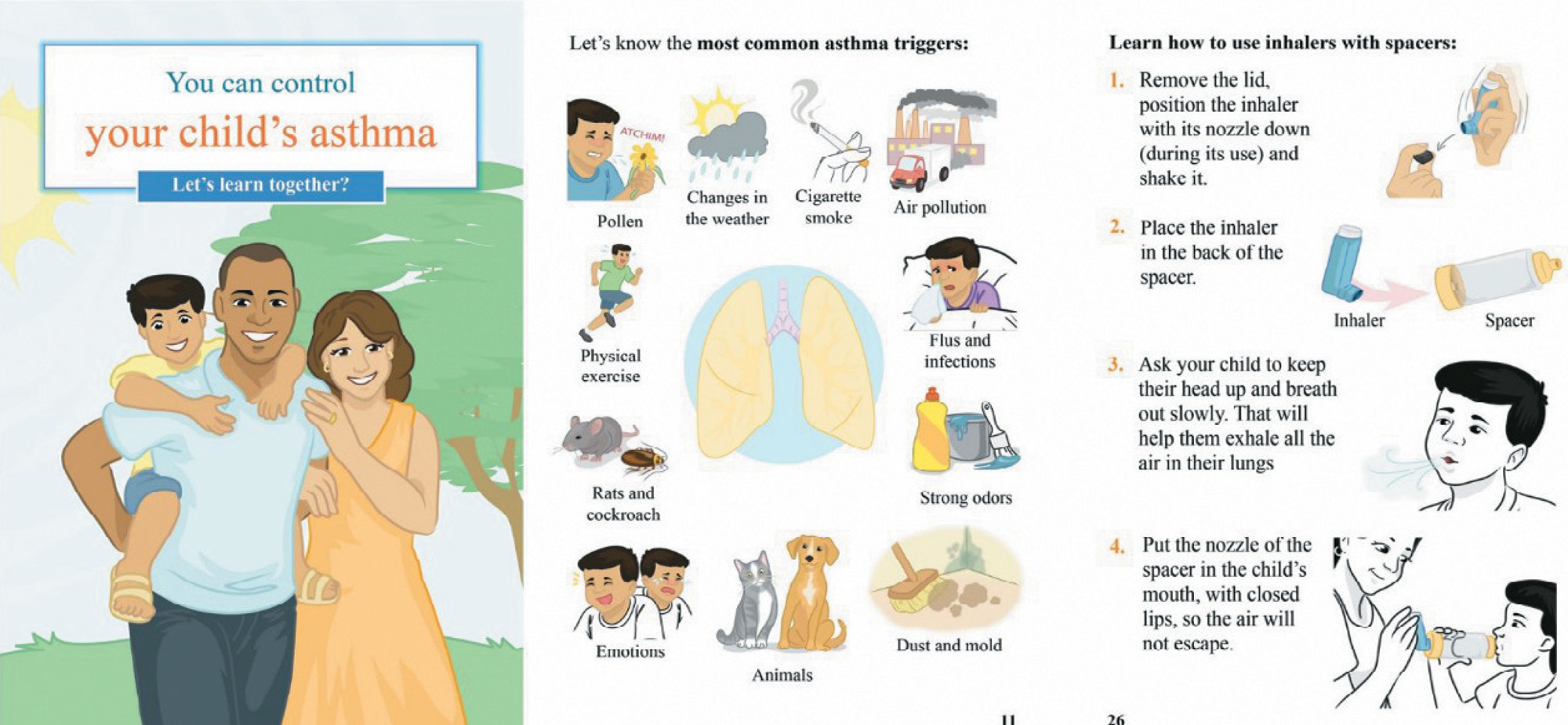
Search
Search in:
Nuvem de Tags
Adolescente (85) Atenção Primária à Saúde (239) COVID-19 (91) Criança (91) Cuidados de Enfermagem (269) Educação em Enfermagem (151) Educação em Saúde (139) Enfermagem (930) Enfermagem Pediátrica (86) Estudantes de Enfermagem (77) Estudos de Validação (131) Família (87) Idoso (208) Promoção da Saúde (99) Qualidade de Vida (104) Saúde do Trabalhador (86) Saúde Mental (145) Saúde Pública (82) Segurança do Paciente (150) Tecnologia Educacional (100)



